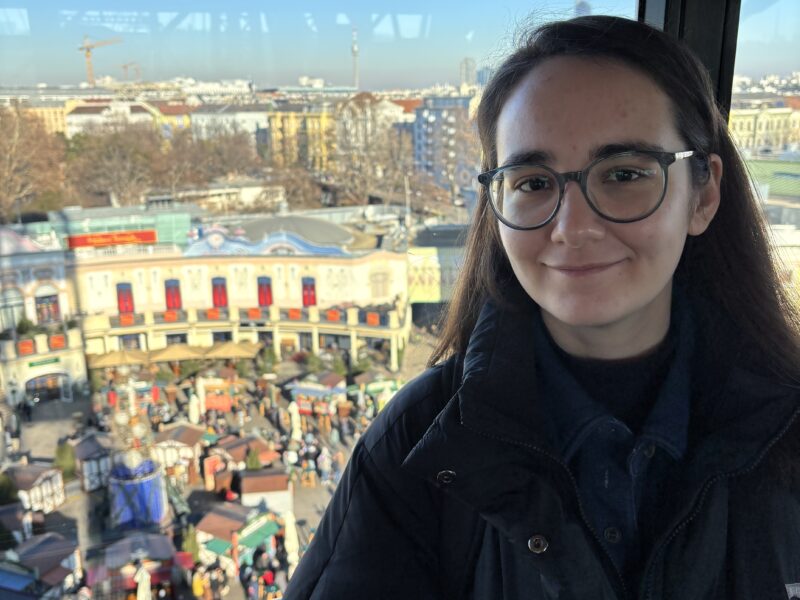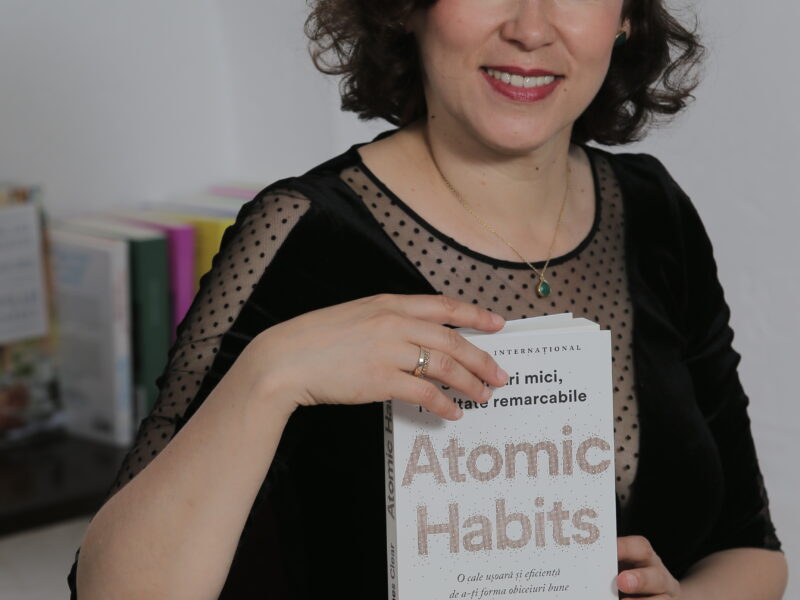Mircea Martin is Professor Emeritus of the Faculty of Letters, University of Bucharest and corresponding member of the Romanian Academy. Literary critic and theoretician, he’s the president of the Association of General and Comparative Literature, editorial director of the cultural magazine Euresis, director of the Interdisciplinary Center for European and Romanian Studies Tudor Vianu at UB and member of the International Association of Literary Critics. Among the published volumes are Generation and Creation (1969), Elocution of Ideas (1981), G. Călinescu and the complexes of Romanian literature (1981), Introduction to the work of B. Fundoianu (1984), Radicalism and Nuance (2015). He coordinated (along with Christian Moraru and Andrei Terian) the anthology Romanian Literature as World Literature, an anthology published by Bloomsbury. From 1990 to 2000 he was the director of the Univers Publishing House and president of the Romanian Publishers Association, which he founded. After that he was an editorial director at Paralela 45 and ART.
Because I would like to make known through this site (at least) a part of the recent history of the Romanian publishing world too, I would like to start by asking you what the Univers Publishing House looked like in 1990, when you took over the management, where the headquarters were and how it worked.
In 1990, the Univers Publishing House operated in the central building of the House of the Free Press, at the 8th floor, it was in professor Romul Munteanu’s charge and was, I think, the most important publishing house in Romania. The most "read", in any case, because its offer of books was composed, mostly, of foreign literature, novels in the first place, but also of books of literary criticism, theory, which were in great demand in those years, for well-known reasons.
I imagine that in 1990, when you took over the management of Univers Publishing House, the sense of freedom to be able to do everything that was not possible until then was seconded by economic, social, bureaucratic instability. Do you remember what the biggest challenges were then? And how did you overcome them?
It is true that the sense of freedom was the dominant feeling, the one that enlivened us all at that moment and was the argument that made me accept the management of a publishing house. Especially of a publishing house like Univers. But I always carried a different feeling, namely that this freedom is a conditional freedom and that the publishing house is not mine: it is a public publishing house, therefore I cannot afford to give in to personal choices or some desires that belonged to my formation or my cultural preferences. A conditioning that I imposed on myself.
Indeed, there have been many challenges. In fact, I took over the management of Univers in April '90, although I was appointed in January by the Minister of Culture of that time, Andrei Pleșu. Why did I postpone taking over the publishing house? Because I left time for action, conviction, negotiation to Professor Romul Munteanu, who, in my opinion, was a good manager of the institution and a good coordinator of the selection of titles, under the given conditions, of censorship and dictatorship.
The difficulties already appeared in the first months of 70s91; first of all, the difficulty of procuring the paper, but also of available finding printer houses, the great printing house from the House of the Free Press being more and more requested. Not to mention the problems of broadcasting, which worsened as the central broadcasting system was dismantled, so to speak. How did I overcome them? Hard, I admit, and harder and harder. I also had to cultivate personal relationships with printing directors, I had to travel to paper mills in the province. The Univers Publishing House, dependent as it was at the beginning, like the other state publishing houses, on the Ministry of Culture, did not have its own paper deposit, like the newly established and privatized Humanitas publishing house, as heir of the Political Publishing House (directly subordinated to CC to PCR).
On the other hand, the quality of the paper was not the needed one, the one I wanted. Whatever. These were moments I remember with a kind of sad amusement. The important thing is that we managed to overcome them.
And because you’re talking about paper and how hard it was to get it. Now, from what the editors told me and from what I see happening at the agency, the average circulations are somewhere between 1500 and 2000 copies. This is for translated books, possibly fiction. How were they then?
It must be said that these are translations, because, as far as I know, the average circulation for the rest of the books I now far from reaching 1000 copies.
True. And what were they then, if you remember? Were those huge prints from before continuing?
Yes, yes, the titles that were bestsellers before the '90s have kept these massive circulations. They continued for a long time, that is, good years. And this gave the Univers Publishing House great stability; moreover, it created the possibility that, through the revenues that Univers brought to the Editorial Center - because then the publishing houses were reunited in an editorial center - to support the activity of the other publishing houses, which, publishing Romanian books for example, no longer managed to earn enough income to survive autonomously. That was until about 70s95, when, if I remember correctly, the publishing house was disbanded and each publishing house had to survive on its own.
Then I think some of the publishing houses have disappeared.
Yes, here's a broad discussion. They disappeared for several reasons. But, first of all, because public demand had diminished.
You talked about broadcasting before. And now a lot of people are complaining: either they are asking for discounts that are too big, or because payments are being delayed. You said that even then there were problems; but, after that centralized system was disbanded, did other distribution agents manage to get back on their feet? Especially outside Bucharest?
Very hard. And here I remember that I traveled around the country, to establish some direct, personal relationships with certain broadcasting centers. I remember going to Arad, to Timișoara, to Brașov.
And were there separate discussions with the bookstores?
Some bookstores were taken over from the start by private individuals. That's what happened. But the relations were really difficult and, in my opinion, for the book industry, the abolition of the centralized system was bad.
Of distribution?
Of distribution, yes. Because, as I later noticed in my visits abroad, in France, for example, these systems existed, were centralized and were functional.
Another challenge for publishers today is promoting the books. It’s not enough to publish them, you have to promote them. How important was this step of promotion then, in the 70s90s?
Promotion also began to be important in the '1990s. Until then it wasn’t, because the book was a coveted and desired object anyway, difficult to access in relation to the high demand for any kind of title, for the desire to read that existed in the 70s70-70s'70s and' 80s, in the communist years, when, obviously, in the absence of other offers, people read with great zeal. And the book really had a central role in education, in the intellectual and moral education of the people. After the 70s90s, things started to diminish and eventually disappear, unfortunately, so the promotion became more and more important.
What were the most effective means? I guess the written press was on top.
Of course. The written press, but also the launches we organized at the big bookstores in Bucharest, the Eminescu bookstore, the Sadoveanu bookstore, Kretzulescu, etc.
So they contributed too.
Many copies were sold right after the launches. And the launches were announced in the press and through these very announcements the public would find out about the book and could have access to it. The problem today is that you no longer know about the book launches, you discover with great delay and almost by chance titles that appeared a few years ago. In bookstores you can't find all the titles, as it was before. In a bookstore in Bucharest you could find most of the book offer in the whole country. This is no longer the case today. A great vanishing took place.
How important was the mouth to mouth promotion at that time? Did these recommendations passed on from one to the next?
I don't know to what extent, but this system also worked, for sure. There was still a kind of remnant of the intellectual cohesion that had functioned in the years of totalitarianism, there were intellectual nuclei that, of course, contributed to the spread of certain titles. Today, those nuclei have turned into networks, effective from an advertising point of view, but they have a very limited, petty area of interest, they are more and more clearly outlined, but not assumed as such, closely linked to an agenda. Often, unfortunately, political.
During the directorship of Univers, the publishing houses founded before 1989 coexisted with the new ones that appeared after the fall of the communist regime. In 1991 you founded Asociația Editorilor din România [the Association of Romanian Publishers]. How did the relations between the competing publishing houses work then? What was the climate like?
We’ve made efforts in this regard, because there is no such desire among private publishers. The idea of competition was much stronger and new entrants didn’t understand the need of organizing in a body that defended common interests. I managed to set up this association in 70s91 and maintain it until 2000, when, together with the entire board, I resigned. What happened? We had managed to raise some funds and we had a treasurer who, in two months of summer vacation, appropriated the money to himself. Sad moment! Which says something about our inability to do something together. To build and maintain visible and reliable institutions.
How did you convince those who joined in the early stages to join the association? You said they weren't eager at all.
I actually convinced them person by person. That was it. I managed to convince them and, in the end, they realized that this association was a necessity. And we managed to get funds from the tax that importers of copy machines paid when the machines entered the country.
But to resume the whole story. In 70s91 or maybe '92 I was invited to Norway. Not on the editorial part, but on the university one. I met there publishers and was even invited to the Norwegian Publishers' Association. And I found out on this occasion that they get funds from the taxes of the owners of copy machines. I don't remember what the percentage was, but a sum went to the publishers' association, on one hand, and to the writers, on the other. Back in the country, we managed, with the help of some parliamentarians, to introduce this system in Romania as well, so that both the Writers Union and the Publishers' Association received significant sums of money. And they still receive them. Obviously, in the meantime, several publishers' associations have emerged and raised claims. The way it always happens. All these things are too well known by those who were in the publishing field then.
But for those who were not they are completely new.
It may seem like a sensational thing now, but it really happened...
Both at Univers, but also at Paralela 45 and Art, you had a project to recover the titles that couldn’t be translated and published before 1989, but also to synchronize the Romanian book market with what was happening at that time on the international market. How did you come into contact then with the owners of the translation rights of those titles? Did you have personal connections already established with foreign publishing houses, were you collaborating with literary agents?
First of all, it must be said that it has been published a lot at the Univers Publishing House. Important titles, founding books, fundamental books, which, after all, as you know, entered the compulsory bibliographies of humanistic sciences students. Of course that this synchronization effort, as you call it, continued. Unfortunately, here I’m going back to what I said at the beginning, this choice of books of critical theory, of philosophy of culture was conditioned too by the need to maintain the publishing house's income, because the demand for such books was not the same as before.
I admit, therefore, that I couldn’t publish everything I wanted. Neither at Univers, nor at the publishing houses where I did the subsequent editorial program, Paralela 45 and Art. I had extremely important lists of books, but as it wasn’t my money, but the money of others - and in the case of Univers, it was public money – I had to be very careful with the selection.
And from whom did you get the translation rights then? Directly from the publishing houses?
From publishing houses and from specialized agencies, of course.
Did you have previous personal connections with them or did you approach then?
In the case of the Univers Publishing House, there were already established relations, which, obviously, I fortified by participating to international fairs, by negotiations on the spot, by the discussions I had with publishing directors and publishers or with the respective agencies. The participation to fairs was essential in this regard. When I switched to Paralela 45 and then to Art, procuring these rights was much more difficult, because these relationships didn’t exist. Many rights were already bought, occupied, reserved by Romanian publishers and I had to find other titles, other authors. It was a more difficult job compared to what I had found and had continued to build at Univers.
Some of these titles were aiming more humanities specialists and less the general public. I imagine that for some authors you had to make real pleadings to convince those on the editorial board at Univers and the owners of Paralela 45 and Art to publish them. How were these negotiations going? Or did you have a completely free hand?
It was necessary to convince not only the owners, but even the board colleagues, especially those from the Univers Publishing House, that we must continue to publish books of theory and criticism, despite the fact that they sell more poorly. And that the prestige gained by the Univers Publishing House must be maintained through such books.
Of course, I didn't have a completely free hand and I must say that I didn't give it to myself. I’m talking especially about the Univers moment, when, being a director, I could’ve imposed a certain point of view and assumed it as such, but I did not want to force the note in any way, because, once again, I kept saying to myself that it was not my publishing house and, therefore, the decision I was making had to have the approval of the members of the editorial board. In connection with the other two publishing houses, which were managed by people who had invested their own money in setting them up, I also used arguments regarding the necessary prestige of the publishing house and, for the most part, I succeeded. Not always and not always with satisfactory material results. I remember, for example, what it was like when I convinced the owner of the Art Publishing House to start editing Fundoianu's works and I published two volumes in excellent conditions. From the first volume, which contained the poems of this very important Romanian-language poet, the sale didn’t even reach 150 copies. And not even the second volume, which contained an exceptional work of the author, Baudelaire and the Experience of the Abyss, didn’t sell better either, although here I obtained a foreign grant, which covered the costs of the translation. Therefore, I had to submit to the records, to find that the stacks of unsold books have a lot of weight on the situation of the publishing house and to take into account this situation. It's just an example.
And because you mentioned the book fairs, do you remember what was the first international book fair you attended as a publisher and what was that experience like?
It was the Frankfurt Fair, which is the most important in the world, even if it’s probably not the largest.
Was this in the 70s90, 70s91?
I think it was in the 70s90. It was an overwhelming impression from all points of view. I must say, however, that the possibility of making comparisons with the program of other well-known publishing houses at European level, large publishing houses, didn’t left me with any inferiority complexes. The Univers Publishing House had a respectable program and respected as such by foreign partners. And I tried to get the same level of quality and cultural representation in Paralela 45 and in Art. The quality of the request you make matters a lot. It‘s one to ask for consumer literature, easily salable, and it’s another to ask for literature whose quality you don’t doubt, but whose bookstore success you cannot be sure of. At that time, fortunately, good books could still be browsed in bookstores. Today they become visible only through material and promotional insistence.
And with these efforts you’ve created numerous collections that still resonate in the minds of many younger and less young readers, such as “Sinteze” or “Prima verba” at Univers, “Ocheanul întors”, “Demonul teoriei”, “Cărți cardinale” at ART, along with the late Laura Albulescu. Do you have a favorite collection among these or among the ones I didn't name here?
It's hard for me to choose. At Univers I thought it was important to update the existing collections, to remodel them somehow. I divided the collection of universal literature into two: in "Classics of Modernity" and, obviously, in a series of contemporary authors (Orwell, Fowles, Michel Tournier, Boris Vian, Italo Calvino etc.). It seemed important to me to recover, although it was not in the profile and vocation of the Univers Publishing House, Romanian literature, to recover the literary production of the exile, as well as to encourage contemporary Romanian literature. This is how we set up the "Prima verba" collection and, regarding exile, the two collections, "Itaca" and "Recuperări". Univers was the first publishing house to reintroduce the authors from exile in the local circuit.
Yes, "Sinteze" is a series whose titles I evoke not without nostalgia: The Second Sex by Simone de Beauvoir, which lays the theoretical foundations of feminism, Masters and Slaves, the study of the great sociologist Gilberto Freyre, who ignited a mental revolution in the Brazilian society etc. We should also mention the "Spectrum" collection, dedicated to imagery books and started with Danubius, the famous volume by Claudio Magris. Likewise, "A treia Europă/Third Europe", meant to open the appetite of the local public for the authors from our geographical proximity, not only for the western ones. I continued this collection at Paralela 45 under the name "Proxima", as well as the one dedicated to "Romanului unui oraș/The Novel of a City" (Barcelona, Petersburg, London etc.).
You mentioned the name of Laura Albulescu, who disappeared suddenly and so unfairly from among us, a person of maximum intelligence and sensitivity, whose editorial career began at Paralela 45 and continued at ART. Her name is deeply engraved in the whole activity of these publishing houses, as well as in my intellectual and affective memory.
While Univers was a publishing house with an already cohesive tradition and portfolio, Paralela 45 and Art, with which you collaborated as editorial director, were emergining projects. Which situation required more effort and which one brought you the satisfaction to match?
All of them brought me satisfaction, insofar as the valuation criteria were the ones I already mentioned. There were no material satisfactions, there were intellectual satisfactions, satisfactions related to the prestige of each publishing house and, especially, to the role of published books, to their echoes in building a public culture. I’m not sorry for the time I invested in the publishing field, I’m sorry for the books I didn’t write during this time.
Do you still follow the activity of the publishing houses in the development of which you have been involved: Univers, Paralela 45, Art?
As for the Paralela 45 and Art Publishing Houses, I still follow their activity, without doubt. I’ve maintained cordial relations with their owners and I’m happy with their successes. As for Univers, I can't forget that I left it by resigning, not accepting the abuses that the new owners did and were going to do. The truth is I didn't have much to look forward to, because Univers had become an apartment publishing house. However, I notice that, in recent years, the publishing house has taken wings, it’s developing, it’s resuming some previous collections. I'm glad. It would be a shame for the name and reputation of the "Univers" to be lost.
The interview was recorded and transcribed.
The main photo was used with the approval of Observator Cultural magazine. [Translated into English by Silvia Codescu.]



